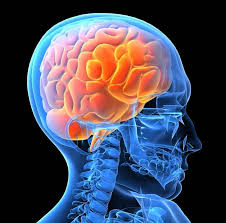 Why do we study other animals and they don’t study us? What is it about the human brain that allows the cognitive ability for abstract reasoning and creativeness? What is it that makes the human brain so special? It comes down to one thing that humans do that no other living creature does.
Why do we study other animals and they don’t study us? What is it about the human brain that allows the cognitive ability for abstract reasoning and creativeness? What is it that makes the human brain so special? It comes down to one thing that humans do that no other living creature does.
I just watched a fascinating TED Talk by neuroscientist Dr. Suzana Herculano-Houzel where she looks at the difference in animal brain structures and arrives at a shocking, yet simple explanation.
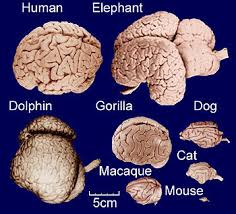 For years, mainstream science assumed that there was a direct relationship to the rate of intelligence and the size of the brain. However if you look at the brain of a cow to the brain of a chimp, they both weigh around 400 grams. Using that theory, the two species should have about the same intelligence. Carrying it further, a human brain weighs about 1.5 kilograms, an elephant’s is 4.5 kilos, and a blue whale tops out at 9 kg. Something clearly is wrong with the size of the brain vs. intelligence theory.
For years, mainstream science assumed that there was a direct relationship to the rate of intelligence and the size of the brain. However if you look at the brain of a cow to the brain of a chimp, they both weigh around 400 grams. Using that theory, the two species should have about the same intelligence. Carrying it further, a human brain weighs about 1.5 kilograms, an elephant’s is 4.5 kilos, and a blue whale tops out at 9 kg. Something clearly is wrong with the size of the brain vs. intelligence theory.
Is there an intelligence relationship in the size of an animal’s brain to the size of its body?
Take gorillas for instance. Their bodies average 180 kg and their brains are 0.5 kg. Human bodies average 75 kg and our brains are 1.5 kg. So the human brain to body ratio are 7.2 times larger than gorillas and we appear to be a lot smarter – although that’s debatable with some people.
But the daily energy consumption that a human brain requires is proportionately much higher than a gorilla’s brain.
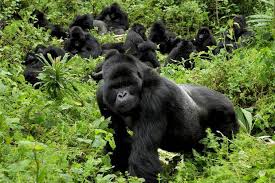 Gorillas spend most of their day feeding to supply energy in keeping a larger body mass fuelled, whereas humans only require three quick meals to support a smaller body but a larger and more active brain. Human brains are only 2% of our body mass but require 25% of our energy consumption to operate. Gorilla brains only consume 10% of their daily calorie intake. So what’s going on here?
Gorillas spend most of their day feeding to supply energy in keeping a larger body mass fuelled, whereas humans only require three quick meals to support a smaller body but a larger and more active brain. Human brains are only 2% of our body mass but require 25% of our energy consumption to operate. Gorilla brains only consume 10% of their daily calorie intake. So what’s going on here?
Dr. Herculano-Houzel researched the long-held assumption that there was a direct proportion of neurons, or thought processors, per weight of grey matter. It was thought that the human brain held around 100 billion neurons but she could not find the source of this information. So she decided to do some experimentation.
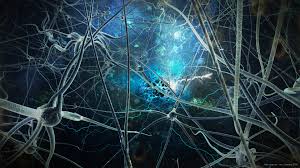 She developed a process to extract neuron nuclei from grey-matter cells and established that the average human brain contains 86 billion neurons – 16 billion in our cerebral cortex alone, which is by far the highest in any species and the seat of cognitive awareness.
She developed a process to extract neuron nuclei from grey-matter cells and established that the average human brain contains 86 billion neurons – 16 billion in our cerebral cortex alone, which is by far the highest in any species and the seat of cognitive awareness.
She observed that there was nothing different in the basic structure between human brains and other primates like gorillas, chimps, and orangutans. And yes, humans are just another species of primate. It’s just that we have a much higher brain to body size ratio and we have a lot more neurons that our cousins do.
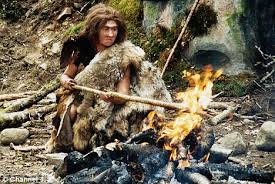 But our brain to body energy requirements are so much higher than apes, yet we feed far less. This led her to ask the question – What happened in our evolutionary process that made human brains so proportionately larger?
But our brain to body energy requirements are so much higher than apes, yet we feed far less. This led her to ask the question – What happened in our evolutionary process that made human brains so proportionately larger?
Anthropology determines that the human brain suddenly increased about 1.5 million years ago. Something else happened at the same time.
Humans learned to cook their food.
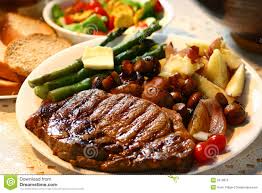 We learned to use fire to pre-digest our caloric intake which supercharged the ability to fuel and grow the brain. Because of cooking high-calorie, high-protein foods, our brain size rapidly increased to becoming a large energy-consuming asset rather than a liability.
We learned to use fire to pre-digest our caloric intake which supercharged the ability to fuel and grow the brain. Because of cooking high-calorie, high-protein foods, our brain size rapidly increased to becoming a large energy-consuming asset rather than a liability.
Humans spent far less time searching for, devouring, and digesting low calorie raw vegetative foods than other primates did. Our omnivorous diet allowed us to focus our cerebral cortex on developing better food processing ventures like agriculture, civilization, electricity, and supermarkets.


Seems to be satisfactory. But what if if we cook n feed gorilla? Will it produce enough amount of neurons and become smart as humans? No offence but am curious for this answer.
I think gorillas are already smarter than some humans 🙂
Barath, evolution usually takes a bit longer than that. And I do think the margin of changes that you are talking about would be on the evolutionary scale, rather than the individual.
I read an article in Science News that said that primates (I forget if they were referring to gorillas or chimps) will choose to eat cooked food over uncooked if given the opportunity. It’s just that they don’t normally get the opportunity, which kind of says to me that the biggest breakthrough was actually creating and controlling fire. Once we had fire mastered, we could regularly cook our food and from there we could develop better brains, and with better brains comes better methods, etc.
We do have a number of other interesting advantages over other animals: our endurance, shock resistance, and ability to recover from injury is absurdly high compared to almost any other animal. We often use the phrase “healthy as a horse” to connote heartiness – but compared to a human, a horse is as fragile as spun glass. Where a simple broken leg will cause most species to go into shock and die, we can recover from virtually any injury that’s not immediately fatal. Our strength and speed is nothing to write home about, but we don’t need to to overpower or out run you, we just need to outlast you – and by any other species’ standards we just plain don’t get tired. There’s mounting evidence that our primitive ancestors would hunt large prey simply by following it a a walking pace, without sleep or rest, until it died of exhaustion; it’s called pursuit predation. Thats also supposedly how we first caught and tamed horses, by walking them into the ground, then capturing them.
And, as a rather snarky comment in a sci-fi book I once read put it, dolphins probably would have evolved to become even smarter than us if it was possible to light a fire underwater.
Many thanks for the post, Garry, I’m very glad you liked the TED talk so much! I’ll have a book coming out next year with the full version of the story, called The Human Advantage.
All the best,
Suzana
Hi Suzana & thanks for connecting. Your TED talk was fascinating and deserves to be shared. Let me know when ‘The Human Advantage’ is ready for release and I’ll help promote it. 🙂 It’s great stuff like your talk & book that makes this blog!
Absolutely fascinating! I love the TED talks, they’re always so interesting and fun. The dog brain looks remarkably small and yet we know how smart they are. Really good stuff, Garry, as usual!
Thanks, Sue. Good point about a dog’s brain size vs intelligence. Seems that it’s the high ratio of neurons to grey matter that does the trick. Speaking of dogs and tricks – I’ve got a fat, old corgi sitting here who’s enjoyed a tremendous life by outsmarting me 🙂